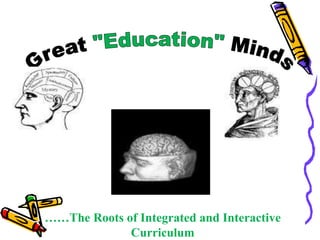
Historical Roots of Integrated Interactive Curriculum
- 1. ……The Roots of Integrated and Interactive Curriculum
- 2. Inquiry Questions: What historical connections are there between progressive education and active/interactive curriculum? Who have been the influential leaders of education, both past and present? What have we learned from these educational leaders, and how can we apply this to our own teaching? Learning Outcomes: Students will examine the roles and influence that historical educators have had on current curriculum paradigms Students will create a visual representation of one educator using various web 2.0 tools Students will evaluate a integrated unit presentation using UBD principles
- 4. John Dewey: http://www.youtube.com/watch?v=Wjq-TZ9hJ_M Dewey’s designs embedded learning in experience (1938) He demonstrated the importance of giving children the responsibility for their own learning (e.g. projects); he believed that the teacher’s role was to direct children rather than control them Dewey believed that learning was lifelong and that it should take place in a social environment. He advocated field studies and immersion in experiences to stimulate learning. We see Dewey’s influence in community service and civic projects (e.g. service learning) United States ”LearnbyDoing ”
- 5. Jean Piaget http://www.xtranormal.com/watch/12980773/jean-piaget- interview Piaget’s work influenced teachers through designs of discovery learning (1970) Piaget believed that students learn best by manipulating subject matter and objects and interpreting their findings We see Piaget’s influence in science inquiry experiments, problem-based learning models, and case studies Piaget believed that discovery learning should be “hands on” Switzerland “Tounderstand isto invent…discover”
- 6. Paulo Freire http://www.youtube.com/watch?v=F7Vu29XNQKA&feat ure=plcp&context=C3409f79UDOEgsToPDskJtDGkQ7w TtYbHZLnod3UGq Freire’s work influenced teachers through designs of problem-posing education (1972) Freire’s central premise is that education is not neutral; whether it occurs in a classroom or community setting, the interaction of teacher and student does not occur in a vacuum. Freire believed that education starts from the experiences of people. Freire proposed a dialogic approach in which everyone involved (students and teachers) participated as colearners; the goal being critical thinking through a problem- posing model. This model involved three steps: 1) listening, 2) dialogue, and 3) action Brazil “Education involves ‘banking’ – making depositsinyourintellectual bank”
- 7. Lev Vygotsky http://www.youtube.com/watch?v=xOc3L_fAc2Y We see the influence of Vygotsky’s designs through the many studies of classroom interaction patterns (1978) Vygotsky’s theory suggests that we learn first through person-to-person interactions and then individually through an internalization process that leads to deeper understanding (reflection). We see Vygotsky’s influence in cooperative learning and in interactive strategies such as debates, discussions, and effective questioning practices Vygotsky believed that students are guided by others including the teacher, mediator or advanced students Russia “TwoHeads areBetterThanOne”
- 8. Reuven Feuerstein http://www.xtranormal.com/watch/12978441/historical- figurez-movie Feuerstein performed ground- breaking work in cognitive modifications with traumatized children of the Holocaust (1980). Feuerstein’s learning theory refutes the concept of an unchanging IQ, and leads to an examination of how the classroom affects students’ metacognition (ability to think about “thinking”). Feuerstein believed that the discovery process requires intervention from the teacher to guide learning to provide students with a deeper understanding and reflective transfer. Teachers should lead students to think about their thinking. Romania (Jewish) ”Learning ismore thanthinking…it isthinking aboutthinking”
- 9. Howard Gardner http://www.xtranormal.com/watch/12965182/the-great- mind-of-howard-gardner Gardner’s work has influenced teachers through his conceptualization of intelligence as multidimensional; he has identified eight realms of intelligence: verbal, logical, spatial, musical, kinesthetic, interpersonal, intrapersonal, and naturalist (1983) Gardner defined human potential in terms of the ability to solve problems by using a variety of intelligences when executing complex tasks We feel Gardner’s influence not only in understanding that there are many ways of knowing about the world and making personal meaning, but also in recognizing that there are many ways of expressing what students know and are able to do; this includes valuing performance assessments as an authentic evaluation of student learning. United States “Itisnot how smartyouare,buthow youaresmart”
- 10. Elliot Eisner http://www.youtube.com/watch?v=L7UmlS9pFz4 Eisner’s work has influenced teachers as well as middle school philosophy (1984) Eisner believed that teachers should focus more on “how” to teach students rather than on “what” they are teaching Eisner believed in hands-on experience and integration which would make learning more personally satisfying for students. This should be accomplished through a variety of frameworks (e.g. inquiry projects, problem-solving) which allows students to see different perspectives. Eisner believed that there are infinite ways to evaluate, and that children should learn how to learn (metacognition”) American ”LearnhowtoLearn”
- 11. Marian Diamond http://www.youtube.com/watch?v=D-XULa_ttKo The 1990s has seen an explosion of research on the brain and learning. Neurobiologist Marian Diamond’s work on the growth of dendrites in the brain as been very influential (1998) Diamond believed that dendrites grow in a stimulus-rich environment, and whither in an impoverished one. We see her influence in creating enriched environments where the learner is mindfully managing input in a changing environment filled with the sights and sounds that cause dendrites to form neural pathways of insight. United States “UseitorLose it”
- 12. Thinkers of the 21st Century • Marcia Tate • Robert Marzano • Will Richardson • Daniel Pink • Marian Diamond • Harvey Silver • Sir Ken Robinson • Alfie Kohn • Carol Ann Tomlinson • Eric Jensen …….and many others
- 15. Wise Words of the Week